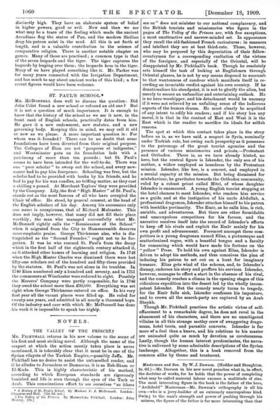NOVELS.
THE VALLEY OF THE PRINCES4 PICICTHALL returns in his new volume to the scene of his first and most striking noveL Although the name of the seaport at which the action mostly takes place is never -mentioned, it is tolerably clear that it must be in one of the -Syrian vilayets of the Turkish Empire,—possibly Jaffa. Mr. Pickthall has no desire to assist the untravelled reader, and if he alludes to Jerusalem or Damascus, it is as Esh-Sham or El-Kuds. This is highly characteristic of his method, according to which European standards are rigorously banished and life is seen through the eyes of the Turk or Arab. This conscientious effort to see ourselves "as ithers • A History of St. Paul's School. By Miohael F. J. McDonnell. London : Chapman and Hall. [12a. ad. net.] t The Valley of the Princes. By Marino:lake Pickthall. London: John Murray. [Gs.] see us" does not minister to our national complacency, and the British tourists and missionaries who figure in the pages of The Valley of the Princes are, with few exceptions, a most unattractive and narrow-minded set. In appearance they recall the old-fashioned French caricatures : in manners and intellect they are at best third-rate. Those, however,
who may be prepared by this depreciation of their fellow- countrymen for a corresponding exaltation of the virtues of the foreigner, and especially of the Oriental, will be disappointed by Mr. Pickthall's book. Though he resolutely sets himself the task of looking at Englishmen through Oriental glasses, he is not by any means disposed to succumb to that wantonness of candour which manifests itself in re- cording an invariable verdict against his own country. If he denationalises his standpoint, it is not to glorify the alien, but merely to secure an unfamiliar and entertaining outlook. He is no hero-worshipper, and his detachment would be uncanny if it were not relieved by an unfailing sense of the ludicrous aspects of the human drama. He must clearly be acquitted of any intent to edify his readers ; and if his story has any
moral, it is that in the contact of East and West it is the East which is the readier to sacrifice its ideals for selfish reasons.
The spot at which this contact takes place in the story before us is, as we have said, a seaport in Syria, nominally under Turkish rule, but owing such prosperity as it possesses to the patronage of the great tourist agencies and the presence of various missionaries and priests,—Protestant and Orthodox. There is, as we have already hinted, no hero, but the central figure is Iskender, the only son of his mother, a widow employed as laundress by the Protestant mission. Iskender, like her, is a convert, and employed in a menial capacity at the mission. But being dismissed for misbehaviour, he gravitates towards the Orthodox community, ruled by a robust priest called Mitri, of whose daughter Iskender is enamoured. A young English tourist stopping at the hotel chances to meet Iskender, who renders him service as a guide, and at the instigation of his uncle Abdullab, a.
professional dragoman, Iskender attaches himself to his patron with leechlike pertinacity. The Emir, as he calls him, is rich, amiable, and adventurous. But there are other formidable and unscrupulous competitors for his favour, and the narrative resolves itself into the record of Iskender's efforts to keep off his rivals and exploit the Emir mainly for his own profit and advancement. Foremost amongst these com- petitors is a young dragoman named Elias, a picturesque and scatterbrained rogue, with a boastful tongue and a faculty for romancing which would have made his fortune on the " yellow " Press. To hold his own against Elias, Iskender is driven to adopt his methods, and thus conceives the plan of inducing his patron to set out on a hunt for imaginary treasure. Elias gets wind of the scheme, and, to Iskender's dismay, endorses his story and proffers his services. Iskender, however, manages to effect a start in the absence of his rival, and the comedy reaches a climax in the opening stages of this ridiculous expedition into the desert led by the wholly incom- petent Iskender. But the comedy nearly turns to tragedy, for the Emir falls sick, Iskender confesses his imposture, and to crown all the search-party are captured by an Arab Sheykh.
Though Mr. Pickthall practises the artistic virtue of self- effacement to a remarkable degree, he does not revel in the abasement of his characters, and there are no unmitigated villains in all this strange motley crew of swaggering drago- mans, hotel touts, and parasitic converts. Iskender is far more of a fool than a knave, and his relations to his master are animated quite as much by devotion as covetousness. Lastly, though the human interest predominates, the narra- tive is enlivened by some admirable descriptions of the Syrian landscape. Altogether, this is a book removed from the common alike by theme and treatment.


















































 Previous page
Previous page